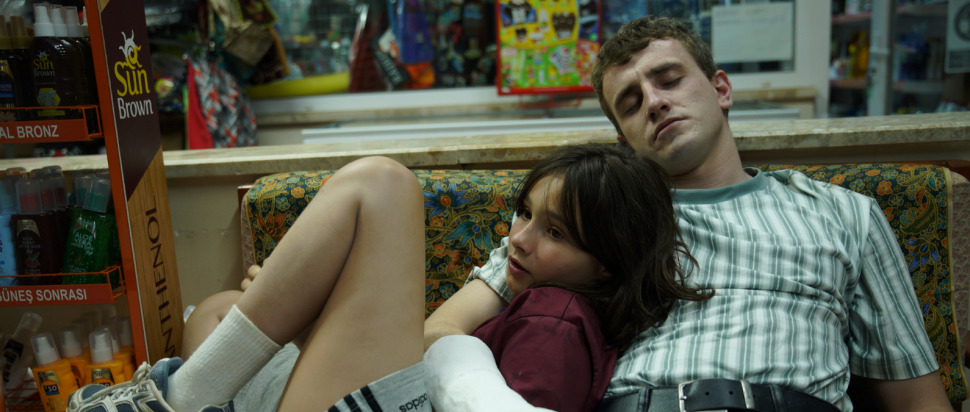Aftersun
Premiering in Cannes' Critics' Week, we take a look at the first feature from Scottish director Charlotte Wells, which centres on Normal People's Paul Mescal as a young father with an uneasy relationship with his pre-teen daughter
The classic British summer holiday is an uncanny excursion in which the laws of nature seem to not apply. Time feels like it stretches on forever, strangers bond together over nothing more than a shared nationality, real life slips away. One such father-daughter trip to Turkey is the setting for Aftersun, the muted debut feature from Scottish director Charlotte Wells.
The film is the most realistic on-screen portrayal of a British family holiday since the TUI adverts. Many will recognise the hotel resort pools with high traffic, every dad’s stubborn loyalty to pints from the Irish pub, and the excruciating nighttime entertainment. (Here, it’s the staff begrudgingly dancing to the Macarena.) But beyond the momentary thrill of seeing vacations past rendered so clearly, the film is a careful unravelling of the fraying relationship between 31-year-old Callum (Paul Mescal) and his pre-teen daughter, Sophie (Frankie Corio).
“When you were 11, what did you think you would be doing?” Sophie asks her father through a camcorder. It's an innocent question that nonetheless seems to bother him judging by his lack of an answer. The role of a parent doesn’t come naturally to him, and he doesn’t seem to want it either. Joining some teenagers for snooker, Callum is asked if Sophie is his sister, and the slight embarrassment in his intonation as he admits that he’s her father is only just perceptible. There’s a bubbling resentment from Callum that stems from becoming a father so young.
On Sophie’s end, she learns that her father is less freewheeling than she expected. Callum can be the fun-loving dad who encourages her to goofily dance and talk about crushes, but then there are moments where he’s closed off, like in a particularly excruciating scene when he refuses to sing R.E.M.’s Losing My Religion with her at karaoke. To that end, Aftersun is also a story about that epiphany that arrives as a child once we discover our parents are just as fallible as any other person.
Comparisons with last year's The Lost Daughter are expected, in the way that they both depict parenthood as complicated at the least, and nightmarish at most. Nevertheless, Aftersun leaves something to be desired when considered next to Maggie Gyllenhaal’s film, if only because it’s so toned down that an emotional release never arrives. But there’s also something to be said about Wells’ intimate approach, which feels just right for a relationship that’s slowly wearing away.
In a film that’s navigating repressed emotion, its small cast is uniformly excellent in communicating subtly. Mescal slips in and out of a faint Scottish accent, but the Irish actor taps into that same level of deeply buried sorrow that garnered him acclaim in Normal People. “There’s this feeling when you leave where you’re from that you don’t really belong there anymore,” Callum admits to Sophie, speaking of his move to London and revealing an aimlessness that’s so confounding for a child also trying to figure out who they are and where they belong. It’s apt in this liminal space of a Turkish hotel that the feelings of disorientation that permeate their lives become that much clearer.
Aftersun had its world premiere at Cannes Film Festival
